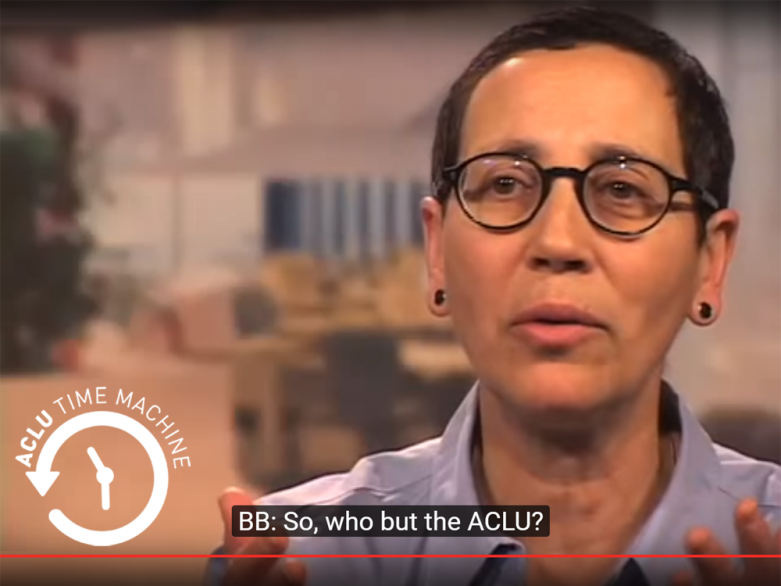#ACLUTimeMachine - Where Breast Cancer Activism Meets Civil Liberties
Page Media

This Breast Cancer Awareness Month, we’re flashing back to 2013, a year that marked both a big win and a big loss for the ACLU and the breast cancer movement.
In a landmark victory on June 13, 2013, the Supreme Court struck down Myriad Genetics’ patents on the human “breast cancer” genes, BRCA1 and BRCA2. The ACLU filed the lawsuit in 2009 challenging the company’s patent on human DNA which led to restricted access to genetic testing, medical care and cancer research.
A key plaintiff in that lawsuit was the nonprofit Breast Cancer Action (BCAction) led for many years by renowned activist Barbara Brenner, an advocate (and former ACLU employee) who helped define a new kind of cancer activism that intersected with civil liberties and focused on causes and prevention rather than just awareness and screening.
Brenner understood how the lawsuit could affect the lives of women and their families. BCAction was the only breast cancer organization that would join as a plaintiff in the suit.
Sadly, just one month before the victory, Brenner died at the age of 61 from complications of ALS (amyotrophic lateral sclerosis).
According to BCAction, the decision to overturn gene patents was “a major rollback of corporate control of our health and creates an immediate and tangible benefit for women with a known or suspected inherited risk of breast cancer.” It means:
Women, and men, concerned about hereditary risk of breast and other cancers now have improved access to genetic testing. The same day the Supreme Court issued its ruling at least 5 companies announced they would offer BRCA testing at a fraction of Myriad’s BRACAnalysis test. Women who could not afford the $3,000-4,000 dollars for Myriad’s test or whose insurance did not have a contract with Myriad, will now have lower-cost options.
For the first time, women who are considering their medical options will have access to second opinions. Myriad’s test has never been peer-reviewed and the FDA does not regulate genetic tests. Second opinion testing is particularly important for women considering removing healthy organs to reduce the risk of cancer as well as for women who have received an ambiguous result from Myriad’s test.
All labs, clinics, researchers and doctors now have access to the human BRCA genes, opening the door to research and studies in new areas that may lead to clinical advances in diagnosis, risk reduction, and treatment in breast and other cancers.
Research and treatment for all hereditary diseases can now advance without fear of patent infringement. This sweeping ruling ensures that the fundamental building blocks of life, our DNA, are available for scientific and medical inquiry and advance.
Brenner’s vision lives on in the organization. Under her guidance, BCAction became the first breast cancer organization to refuse to accept funding from any corporation that profits from or contributes to breast cancer by polluting the environment. She was also the driving force behind the Think Before You Pink campaign, which challenged pink ribbon cause marketing and companies that raise money for breast cancer causes but also make products linked to the disease.
And those values continue to this day. This year’s campaign by BCAction, Toxic Isn’t Tasty, is shedding light on two of this country’s largest citrus growers for using leftover wastewater from oil corporations to irrigate their citrus, while also using pink ribbons to sell them.
Find out more and take action.
Leslie Fulbright is a communications strategist with the ACLU of Northern California.
